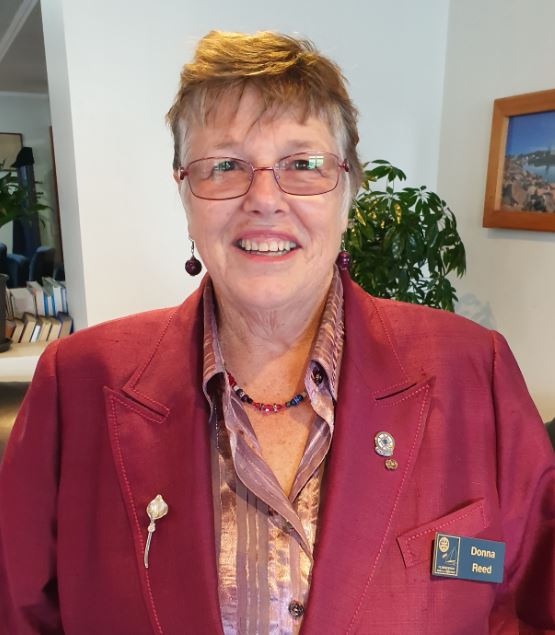 Donna Reed gave us her Viewpoint tonight about Teaching in the 21st Century. She said:
Donna Reed gave us her Viewpoint tonight about Teaching in the 21st Century. She said:
'Mā te Ngākau Aroha Koe e Ārahi' -Let a loving heart guide your decisions.
'The World Health Organization warns: children 2-4 years no more than 1 hour of screen time per day. Under 1? No screen time at all!
'Yet through the eight weeks of Keeping Safe at Home bubble, the gains in the use of technology and screen time by tamariki (children) need to be continued.
'On the other hand ...
'Learning through play is gaining momentum in New Zealand schools as teachers recognise the opportunity for students to develop key competencies, values, and knowledge through play-based learning.
'Learning through play is a pedagogical approach where play is the valued mode of learning – where children can explore, experiment, discover, and solve problems in imaginative and playful ways.
'Learning through play forms the pedagogical foundation of Te Whāriki, the early childhood curriculum. It is also becoming a more common approach to learning in junior primary classrooms with some schools trialling play-based learning at middle and senior primary level.
'Learning is fundamental to learning through play.
'An effective learning through play programme enables children to engage in self-directed play that is internally motivated. Teachers can support children in play-based learning by providing an enabling environment and sensitive interaction. There is a role for the teacher to discuss, embed, and extend the learning with students.
'Learning through play can help schools develop confident, connected, actively involved, lifelong learners. Almost all of the values and key competencies in The New Zealand Curriculum can be developed through play-based learning. A range of learning areas can be explored with connections made across learning areas as well as to home practices and the wider world.
'There is a growing body of evidence to suggest that learning through play brings numerous benefits to students’ learning and development.
'Thinking skills
- Play-based activities enable students to engage in flexible and higher-level thinking processes. These include inquiry processes of problem-solving, analysing, evaluating, applying knowledge, innovation, and creativity.
'Interpersonal skills
- Play-based learning often requires interaction with others and gives students the opportunity to practice language development, cooperation, negotiation, leadership, empathy, active listening, and compromise.
'Intrapersonal skills
- Play contributes to a child’s sense of well-being and can support the development of intrapersonal skills such as self-esteem, motivation, resilience, concentration, persistence, and time management.
'Student agency and engagement
- Play-based learning can encourage student agency and often results in deeper levels of student engagement in learning.
'Smooth transitions to school
- Schools that have adopted learning through play in junior classrooms report that new entrant students settle to school quickly because of improved continuity between school and early childhood education.
'The role of the teacher
'The role of the teacher is critical to a successful learning through play programme. Teaching practices that support effective play-based learning include:
- creating a classroom environment with diverse interest areas that offer rich play opportunities
- drawing on curriculum knowledge to recognise the learning within play
- building play opportunities around student’s prior knowledge and interests
- providing sufficient opportunities for students to engage in play
- participating in meaningful learning conversations with children that stretch their thinking
- understanding and supporting the development of specific skills and knowledge that students need
- facilitating social interactions.
“Playful learning is the magic that takes place when we meld a child’s sense of joy and wonder with thoughtfully planned learning experiences.”
'But, surprisingly, more and more schools are embracing the concept. Learning through play is based on evidence that people learn best when they're engaged – emotionally as well as intellectually.
'Someone I admire who speaks a lot of sense is neuroscience educator Nathan Mikaire Wallis. He has contributed daily to parents and caregivers on the tv home learning Papa kainga programme. He says kids need to "develop an emotional disposition towards learning, finding that something is fun before learning repetitive patterns like words and numbers".
'Self-directed play inspires rich learning
- Student agency through self-directed, open-ended inquiry play is given full rein
'As a Resource Teacher Learning and Behaviour (RTLB) I had discussions with Sarah Aiono of Longworth Education. She explained that a successful play-based learning environment requires a level of skill by teachers.
'It's a topsy turvy time, that's for sure. The axing of National Standards, the review of NCEA, open plan classrooms versus closed ones, an ongoing teacher shortage, return to school as normal. I think of the strengths my tamariki developed at home.
- Ashton aged 4 made a birdseed feeder. He took Grass clippings into his bedroom to feed the dinosaurs building empathy
- Butterflies hatching builds manakitanga and kaitiaki the values of hosting and looking after the environment
- Bella plays counting writing drawing creating and playing schools.
"Nana put your phone away and play with me"
'I fully appreciate the tasks ahead of educationalists as we create a new normal.
'The emotional trauma of students can have an emotional impact on teachers too. The concept of secondary trauma and compassion fatigue, where “we absorb the traumas our students share with us each day.”
'It was my mentor, William Glasser's birthday last month. He called learning through fun a basic need. In memory of the great man and the current pressures on parents assisting with their children's learning I thought this message from him was very appropriate:
"The day we stop playing will be the day we stop learning", William Glasser
My viewpoint is Remember to Play'.
